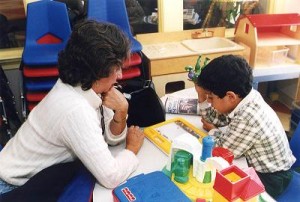
photo credit: Wikimedia.org
Do you have school-aged children? Are you aware that, according to the U.S. Department of Education, “in the next decade, 1.6 million teachers will retire, and 1.6 million new teachers will take their place. This reality presents a true challenge and an amazing opportunity.” American parents need to take full advantage of this opportunity and get involved with education reform. Education is a critical component of successful parenting.
Parents should be concerned that each teacher who enters the classroom is prepared to be successful with their children. In order to protect the future of our kids and our country in an increasingly competitive, knowledge-based global economy parents must help support and strengthen teacher education programs nationwide.
Each new teacher should be given the first-rate preparation and support they need, so that each child can have the effective, well-trained teachers our students deserve. Regrettably, it is evident that the condition of teacher certification and preparation programs is very uneven on a national level.
How do we know the teacher preparation process is not working? In addition to test scores, graduation rates, and other empirical data we have first hand information from a reliable source—the teachers. Sixty-two per cent of new teachers report feeling unprepared for the everyday reality of classroom teaching. Yes, you read correctly, almost two-thirds of all new teachers do not feel they are prepared to do their jobs. Would you get involved if you heard similar statistics for medical school training or law school? Teachers are also professionals with one of the most important jobs around—preparing our children to be successful adults.
As it stands only half of current prospective teachers receive supervised clinical training. Children depend on good teachers to provide a world-class education yet the current system doesn’t exactly guarantee that new teachers are qualified to teach. Parents expect teacher certification or licensure should be based on a demonstration of effectiveness. Unfortunately, that’s not necessarily the case with the current hodgepodge of certification requirements in American education policy. Some licensure tests for teachers are not rigorous, meaningful, or useful and these tests don’t measure the skills new teachers need or indicate how they will perform in the classroom.
Parents should challenge the status quo in teacher education and preparation. As the National Council for Accreditation of Teacher Education has said, the entire process needs to be “turned upside down” in the United States. How can concerned parents get involved?
What Should You Know About Teacher Certification?
If you would like to get involved in education reform there is plenty of work to be done. Following is some information about teacher certification to get you started:
- Many states have recently implemented tougher requirements for obtaining a license to teach in a public school. Typical adjustments have been to increase the amount of formal training required for certification and requiring prospective teachers to score above a minimum grade on a standardized exam.
- In some states, private school teachers do not have to be licensed but may still need a bachelor’s degree.
- Public school teachers are required to be licensed in all 50 States and the District of Columbia, though most states offer alternative routes to certification for individuals with a college degree in other fields but lacking the requisite education courses needed to qualify for a regular license.
- Licensure requirements for teaching K-12 differ by state though all states expect general education teachers to earn a bachelor’s degree and complete an approved teacher training program. These training programs consist of a prescribed number of subject and education credits and supervised practice teaching. Some states also require technology training and a minimum GPA while others demand teachers obtain a master’s degree in education within a specified timeframe once they begin teaching.
- Many schools have cut or eliminated classes and resources for subject areas that are not part of No Child Left Behind’s accountability standards. According to The New York Times, since 2006, almost 71 per cent of schools have cut some instruction time in subjects like history, arts, language and music, in order to allot more time and resources to math and English. In other words, they’re ‘teaching to the test”
- Find out how the teacher certification process works in your area. For example, if your state allows alternative route certification, what are the criteria? Does your state follow proven criteria like that used by Teach for America, one of our country’s leading alternative certification programs for new teachers?
A great place to begin your research on teacher certification in your area is a career resource site or detailed database of the teacher certification requirements in all 50 states. You can also refer to the website of the State Board of Education or licensure advisory committee where you live for more helpful information. Learn about the specific types of testing required for new teachers in your respective state. Educating yourself is the first step in getting involved in education reform.
Anthony Sills is a staff writer for Teacher Certification Degrees, a career resource site providing information on teacher certification in all 50 states.
 Posts
Posts
Anthony, this great post and something all parents should be aware of. As a parent myself, and knowing a couple of teachers, I know that the work they do is very important. We should make sure that our teachers are well-qualified and are not required to just “teach to the test.” Thanks for sharing!
Grady Pruitt recently posted..How To Discipline a Child
Grady,
Thank you! Without doubt, the work teachers do is extremely important. We need to ensure there is cooperation between teachers and parents as well as make sure all new teachers are prepared for the challenges they will face. Education should be about more than standardized tests scores.
Anthony recently posted..Choosing The Best Freelance Writer For Content Writing